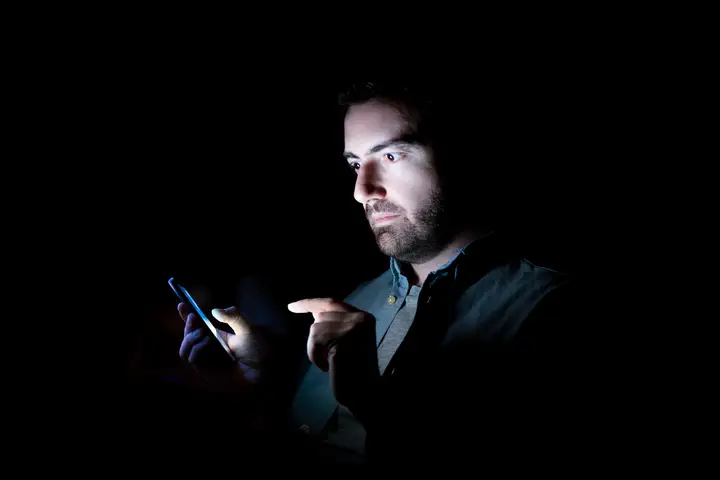The struggle is real in people suffering from ADHD. Hitting snooze repeatedly, setting quite a few alarms, dragging yourself out of the bed and feeling tired in the first half of the day. Some need a loved one to help them starting the day, be it a parent a friend or a partner. Why is it difficult for those diagnosed with ADHD? Is it a lack of motivation or willpower? There is a complex link between ADHD and the sleep-wake cycle. More than half of those diagnosed with ADHD may actually suffer from an undiagnosed sleep disorder.
Sleep disorders and the ADHD clock:

How many hours of sleep do people with ADHD need?
There is no specific number of sleep hours needed. Each individual is different, and the amount of sleep can vary slightly from one person to another. Just like everyone else, people with ADHD generally require 7-9 hours of sleep per night for optimal health and daily functioning. However, achieving this range of sleep duration can be a challenge for many with ADHD due to the sleep problems they experience. This becomes even more problematic if the ADHD diagnosis is linked with a sleep disorder.

Do ADHD brains need more sleep?
As of 2024 there is no specific research study to provide a definitive answer for people suffering with ADHD. For the general population, we have the following recommendations: teenagers (14-17 years) the optimal sleep duration sits between 8-10 hours. In the general adult population, young adults (18–25 years) and adults (26–64 years), research suggest that the recommended sleep range is somewhere between 7-9 hours. Very interesting with age, for adults older than 65 years there is a slight decrease in sleep recommendations 7-8 hours.
While there isn't a definitive answer that people with ADHD need more sleep, research suggests they may benefit from getting closer to the upper end of the recommended sleep range (7-9 hours).

Here is why sleep is important:
Exacerbated Symptoms with less sleep: Studies show sleep deprivation can worsen the inattentive ADHD symptoms. Hyperactivity, and impulsivity seems to be more pronounced when someone is not able to get the right amount of sleep. Some studies suggest that the sleep deprivation can impact the emotional facial expressions in young adults with ADHD and without. Getting enough sleep can potentially help these symptoms to be more under control.
Brain Repair: Sleep is important for the overall brain health, emotional regulation and memory consolidation. With emotional disturbances such as the rejection sensitive dysphoria (RSD), people with ADHD may need more sleep. Optimal sleep duration and quality is crucial for healing, as it allows our body to regenerate cells and restore the energy levels. Quality of sleep positively impacts our physical health, which is linked with mental health, including in ADHD.
Stress management: Sleep allows our bodies and minds to recharge the batteries, but also to some extent reset. Sleep helps with improving our ability to handle stress more efficient. Almost half of the people diagnosed with ADHD in the adult life, may as well suffer with a co-morbid condition. An optimal sleep duration and quality, allows regulating neurotransmitters like serotonin and dopamine, which have a role in mood regulation, focus, and motivation.
Chronic sleep problems can exacerbate stress and worsen existing mental health conditions.

What is the ADHD burnout cycle?
The ADHD burnout cycle is a well-recognized pattern of stress and exhaustion specifically experienced by people with ADHD. The cycle is a result due to the combination of the constant struggle to manage ADHD symptoms alongside daily life's challenges. There are different interpretations and descriptions of this pattern, one of the most common:
The First Push
The cycle starts with enthusiasm and commitment to a task that requires sustained focus and effort. Maybe this time is going to be different.
The struggle and frustration
The ongoing inattentive, and impulsive symptoms combined with difficulty in organization starts to make completing the task more challenging. This is the very well-known feeling of here we go again.
The stress and overwhelm
The stress takes over the person's life, trying to overcompensate by staying late at the office or working unpaid hours during the weekend. The feeling of being overwhelmed further impairs focus and motivation. Getting distracted with other more stimulating and enjoyable activities, only deepens the current problem. The familiar feeling of not being good enough starts once again.
The avoidance
To escape the negative experience the curious brain resorts unconsciously to tactics such as procrastination. Although the problems are still there, somehow all of the tasks are erased from the memory which may lead to a temporary pseudo comfort. Although nobody can understand their behaviour, the person slowly retracts in their own shell as a form of self-preservation.
The exhaustion
The cycle continues with a sense of defeat. Feelings of hopelessness become familiar in conjunction with the constant perceived lack of progress. Here the ADHD sufferer becomes their number one critic and burnout occurs. The ADHD burnout cycle repeats and from here the person may briefly go back towards any of the previous stages. Despite trying their very best, without support the result is usually the same.

What is ADHD morning anger?
ADHD morning anger is a popular term in the neurodiverse community; however, this is not an official diagnosis. This can be explained as a phenomenon experienced by many people with attention deficit hyperactivity disorder (ADHD). It's characterised by feeling irritable, or even experience significant anger upon waking up.
Some of the potential causes of ADHD morning anger:
Please note that morning anger isn't exclusive to ADHD. However, the underlying factors mentioned above can make it more frequent for people with this condition.

ADHD and Top 5 Sleep Tips
1. Sleep hygiene is the first go to place when experiencing difficulties in falling and staying asleep.
2. Master routines and consistency: going to bed and waking up at the same time each day, including during the weekend. Aim to improve upon each cycle.
3. Optimise your sleep environment: dark bedroom, quiet, cool, comfortable mattress and pillows. Some people may prefer having a background noise such as brown or white noise.
4. Relaxing routine before sleep: Relax for 60 minutes before bed with calming activities like taking a warm bath or practicing mindfulness exercises.
5. Optimising Screen Time: Most of the studies were directed towards the link between blue light and melatonin secretion. However, we do not have a full understanding how a notification emitting device such as a mobile phone, or a tablet can interfere with the ADHD brain. Practice self-compassion and return back to basics or set a technology-free time before bed.
Additional healthy tips: Regular exercise during the day and optimal timing by avoid strenuous workouts close to bedtime. A balanced diet, and limited caffeine and alcohol intake all contribute to better sleep quality. Exposure to bright light in the morning can help regulate circadian rhythm naturally.

Addressing Underlying Issues:
Sleep Disorders, if you suspect you may suffer from an undiagnosed sleep disorder, consult your health care professional or an ADHD specialist for diagnosis and treatment. Medication optimisation: Discuss with your healthcare provider if adjusting the dosage or timing of your ADHD medication can improve sleep. Personalised therapy can help dealing with sleep problems, start developing strategies for managing ADHD symptoms and addressing any underlying issues.
Top tip: Change takes time.

Conclusion
Remember, a good night's sleep isn't just about willpower. By addressing the underlying issues and implementing healthy routines, you can break the cycle of sleep deprivation and be in control. Patience and consistency are a must since often results are not taking place overnight. Each individual is unique with their own circumstances and way of life. Like food and oxygen, sleep is a vital component for a healthy life, start prioritising your sleep! With dedication and the right support system, you can achieve quality sleep and experience a brighter, more productive day.

ADHD Specialist Support: assessment and accurate diagnosis
Wondering if you might have adult ADHD? Our guide walks you through step-by-step in the journey of Adult ADHD Diagnosis: Private Adult ADHD Assessment | London and U.K (adhdspecialist.com)
If you live in London or the UK and looking for private psychiatrist specialist in ADHD support:
Read more about the ADHD Specialist's approach in diagnosing and treating ADHD and sleep problems: Adult ADHD & Sleep Problems: Causes, Symptoms & Treatment Options (adhdspecialist.com)
References and resources
Insomnia test- NHS (www.nhs.uk)
MONDAY (ouh.nhs.uk) NHS Sleep Diary
Sleep disorders in patients with ADHD: impact and management challenges - PMC (nih.gov)
News: A Warm Bedtime Bath Can Help You Cool... (NPR News) - Behind the headlines - NLM (nih.gov)
Benefits of a bedtime routine in young children: Sleep, development, and beyond - PMC (nih.gov)
The effect of screen use on sleep quality among adolescents in Riyadh, Saudi Arabia - PMC (nih.gov)
Adult ADHD & Sleep Problems: Causes, Symptoms & Treatment Options (adhdspecialist.com)
Why People with ADHD Struggle to Sleep? | ADHD Specialist (adhdspecialist.com)
Fall asleep faster and sleep better - Every Mind Matters - NHS (www.nhs.uk)
Disclaimer: The information is not intended nor implied to be a substitute for professional medical advice, diagnosis or treatment. All content, and information, contained in this article is for general information purposes only and does not replace a consultation with your own doctor/health professional. Information about mental health topics and treatments can change rapidly and we cannot guarantee the content's currentness. For the most up-to-date information, please consult your doctor or qualified healthcare professional. For more information, you can check the Royal College of Psychiatrists (rcpsych.ac.uk) The NHS has available a free guide about How to fall asleep faster and sleep better.
.svg)
.svg)





.svg)






